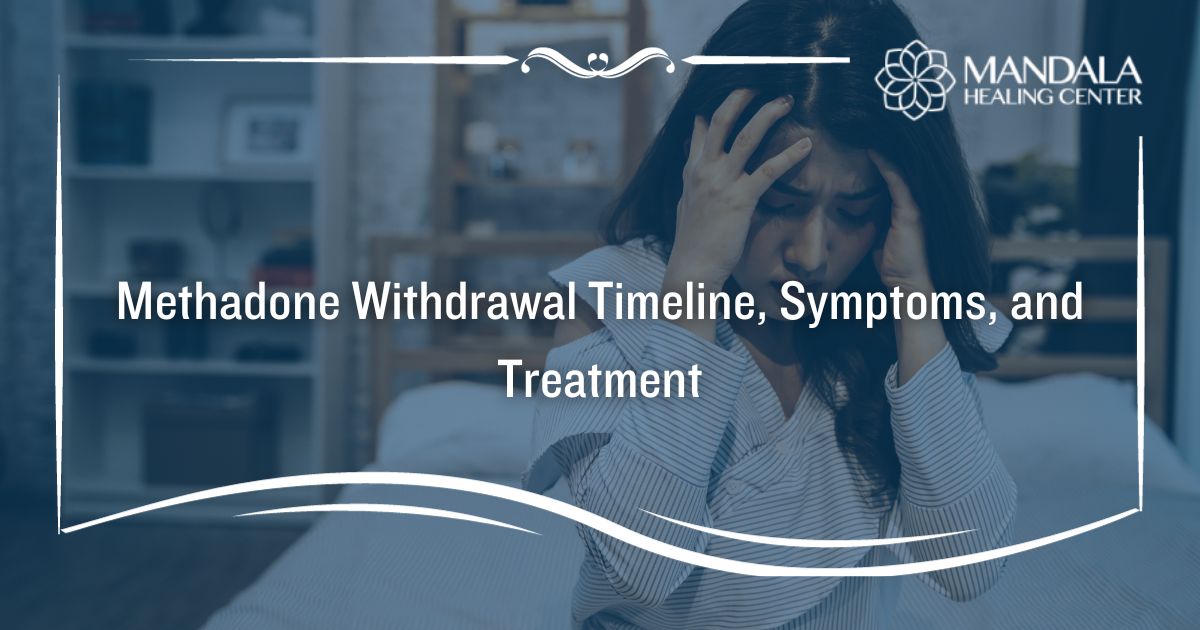Methadone is a prescription medication used to treat opioid use disorder. As a full-acting opioid agonist, it works by binding to opioid receptors in the brain, tricking the body into believing it has received the opioids it craves.[1] In other words, methadone helps people recover from opioid addiction by relieving withdrawal symptoms and cravings.
While methadone is effective in treating opioid use disorder, it can be abused if taken in larger doses. This is why most people who are prescribed methadone only receive one dose at a time. However, if someone gets their hands on enough methadone at once, they could become addicted to it.
If you struggle with a methadone addiction, you will experience withdrawal symptoms upon stopping its use. Methadone withdrawal usually begins within 30 hours of your last dose, peaking on the third day and subsiding within 10 days. Detox centers treat methadone withdrawal by tapering you off of the medication slowly, ensuring that your symptoms remain minimal and you stay safe.
What are the Symptoms of Methadone Withdrawal?
When you are addicted to methadone, your brain and body begin to rely on it to function properly. As a result, suddenly stopping the use of it will lead to withdrawal symptoms. Because methadone is an opioid agonist, it will cause similar withdrawal symptoms as other opioids like oxycodone and heroin.
The common symptoms of methadone withdrawal include:[2]
- Agitation and anxiety
- Restlessness
- Sleep disturbances like insomnia
- Depression
- Increased yawning
- Excessive sweating
- Watery eyes and runny nose
- Goosebumps or shivering
- Nausea and vomiting
- Diarrhea
- Muscle aches and abdominal cramps
While methadone withdrawal is not life-threatening, it can be incredibly difficult to cope with. Because of this, people who attempt to overcome withdrawal on their own often end up relapsing. You should always seek help from a medical detox center when you are addicted to methadone.
What is the Methadone Withdrawal Timeline
Being aware of how long methadone withdrawal lasts can help you gain a better understanding of why detox is so important. Since methadone withdrawal symptoms can affect you for up to 10 days, receiving support from one of these programs is vital to managing long-term sobriety.
While the exact amount of time methadone withdrawal lasts can vary from person to person, the timeline is usually as follows:
24 to 30 Hours
Within 30 hours of your last dose, you will begin to experience the initial symptoms of methadone withdrawal as the drug starts to leave your system. The early symptoms may include irritability, depression, nausea, and slight cramps, or body aches.
While these symptoms are typically mild, it’s important to begin receiving detox treatment right away. Doing so could prevent you from developing more severe symptoms down the line.
3 Days
On the 3rd day of methadone withdrawal, your symptoms will peak, which means they will be at their most severe. The peak symptoms may include vomiting, diarrhea, insomnia, anxiety, shivering, sweating, and painful abdominal cramps.
Thankfully, medical detox centers will slowly taper you off of methadone, which means you will not experience severe side effects if you are receiving assistance from one of these programs.
4 to 10 Days
After your symptoms peak, they will start to subside. Typically, people experience less severe symptoms by the 4th day of withdrawal. By 7 to 10 days, the symptoms will completely dissipate, as your body has finally adjusted to the absence of methadone.
How Do Detox Centers Treat Methadone Withdrawal?
Typically, people experiencing opioid withdrawal will be given a medication like methadone, as it is FDA-approved to treat opioid use disorder. But if you are coming into detox and suffering from a methadone addiction, the best course of action is to slowly taper you off of the medication. This means you will be given a smaller and smaller dose over time until you no longer experience withdrawal symptoms.
In addition to tapering you off of methadone, nurses and other medical staff will routinely check your vital signs. This allows them to notice and treat any medical abnormalities before they turn into an emergency, such as high blood pressure or low heart rate.
It is also important to note that you will have 24/7 access to psychological support during your time in detox. Because methadone withdrawal can cause symptoms like anxiety, depression, and insomnia, having this type of support is vital to your success.
Once you are medically stable and have overcome methadone withdrawal, you will work with your therapist to create a treatment plan for after detox. Your treatment plan may include inpatient treatment, outpatient rehab, sober living housing programs, or a combination of all three.
Find a Methadone Detox Center
If you or a loved one suffers from methadone addiction, it’s time to seek help. While methadone withdrawal can be extremely difficult to deal with, detox programs like Mandala Healing Center can offer you the treatment you need to recover successfully.
Our board-certified physicians and world-class clinical team are ready to help patients struggling with a wide variety of substances, including opiates, methamphetamine, benzodiazepine, and illicit substances.
The Mandala Healing Center understands that addiction presents differently with each patient, as each substance affects individuals in unique ways. After a careful assessment of each patient’s history and patterns of drug use, a personalized detoxification plan is developed. After the physical addiction is treated, healing can then begin.
To learn more about our methadone detox program, contact us today.
References:
- The Substance Abuse and Mental Health Services Administration (SAMHSA): What is Methadone, Retrieved January 2024 From https://www.samhsa.gov/medications-substance-use-disorders/medications-counseling-related-conditions/methadone
- Medline Plus: Opiate and opioid withdrawal, Retrieved January 2024 From https://medlineplus.gov/ency/article/000949.htm












